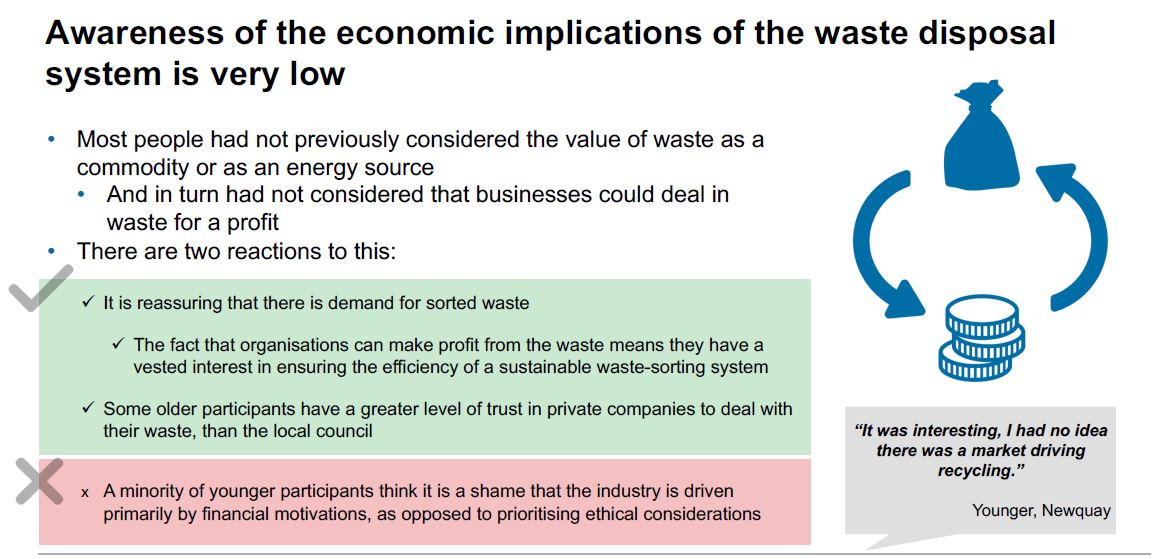Done correctly, extended producer responsibility (EPR) will have a radical impact on consumer shopping habits, according to waste management firm SUEZ.
In a report published today (28 September) the company says that a proper EPR system in the UK would also impact on the collection of packaging and goods at the end of life.
And, research for the report is highlighted by SUEZ which found that consumers are “shocked” by the current PRN system only funding an estimated 10-15% of the collection cost of packaging.
This reference to the PRN system comes as the government is preparing its Resources and Waste Strategy with a number of groups, including SUEZ, supporting changes to the PRN system to better fund recycling collection and sorting. The company said: “SUEZ believes that policies which make manufacturers more financially responsible for the products they sell, once they have been discarded by the consumer, should form a vital part of Environment Secretary Michael Gove’s Resources and Waste Strategy for England, which is expected to be revealed in late November”.

Four workshops were run by SUEZ in England followed by polling of 2,000 people
The suggestions for change to EPR made by SUEZ come after the company carried out research through the ‘Britain Thinks’ organisation which included workshops across the country and a poll of 2,000 members.
PRNs – ‘Shocked’
On PRNs, SUEZ said: “The money paid by the manufacturers for this (PRN) evidence is used to help cover the costs of collecting and sorting waste generated by consumers, but in reality, it only covers between 10 and 15% of the costs, with business and council tax-payers incurring the remaining 90% of costs.”
Consumers across the workshops said they were “shocked” by this and felt that packaging producers in particular were “shirking” their responsibilities and were simply “buying compliance”. They also felt the current system was failing to deliver change because producers weren’t incentivised to move towards more sustainable products and packaging.
During the research, participants were asked about their own consumption habits and the majority said they never or rarely consider the environmental impact of the products they buy at the point of purchase. This was echoed by the national survey, which found that sustainability and waste disposal were the two least important factors for consumers (among those tested) when buying goods.
‘Recyclability’
At the workshops, consumers were asked to design their own measurement system and label which could be applied to all products sold in the UK to indicate environmental performance.
The majority of participants favoured “recyclability – how easy it is to recycle a product” over more complex measurements like carbon footprint. There was also a preference towards a simple, three-tier, grading system and the use of “traffic light” colours to indicate good, average and bad performers. Many participants felt that a negative eco-label would erode a brand’s reputation over time and suggested that “a shopping basket full of bad-performing goods would be embarrassing at the check-out”.
Chief executive of SUEZ recycling and recovery UK, David Palmer-Jones, said: “It’s clear from this new research that consumers want manufacturers to take more financial responsibility for the waste arising from the products and packaging they sell in the UK – and that the current regime is failing to deliver sustainability improvements for some items we all buy and discard every day.
“Consumers are willing to play their part and told us at the workshops that they would even tolerate un-popular cost increases in the short term if it resulted in a better outcome for the environment in the long term – in the same way that we all got used to the smoking ban, the ‘plastic bag tax’ or indeed learning to recycle over the past decade instead of throwing things away.”
(above: video on YouTube of SUEZ UK chief executive, David Palmer-Jones with consumer input and discussion of the EPR research findings)
Feedback
Mr Palmer-Jones continued: “From the feedback we received, we can see that increasing the price of un-recyclable or poor-performing goods through producer responsibility obligations maybe isn’t enough on its own to change consumer behaviour, and that sustainability isn’t at the forefront of shoppers’ minds, but that mandatory on-product labelling could empower consumers to vote with their wallets and shun products and packaging that cannot be easily recycled.
“Creating a well-functioning circular economy is not just the responsibility of manufacturers though. It will require the whole value chain, including retailers, councils, government, consumers, waste management companies and re-processors, to come together to deliver an efficient, effective, joined-up system.
“A producer-responsibility regime for the UK must be fair and promote a level playing field for all manufacturers – not just those with the ability to shoulder increased costs. It should also be efficient and minimise the costs passed on to consumers, while rewarding the brands that innovate, adapt and ultimately create less waste through better designed products and packaging.”
Tangible benefits
Research director at Britain Thinks, Anastasia Knox: “The degree of support for extending producer responsibility beyond the current system was particularly striking. However, it was also clear that to succeed in practice, any new system of producer responsibility will need to be easy to engage with and deliver tangible benefits to consumers.”
Key points from the research:
- Most report consciously considering good waste disposal habits on a daily basis, and say they do their best to recycle when they can. However, their behaviours suggests that, on a day-to-day basis, this issue is not, in fact, top-of mind.
- While people do think about recycling at the point of disposal, there is little consideration of the sustainability of products while shopping, where quality and price considerations are more important.
- There is frustration about paying extra to the council for green waste disposal facilities and new restrictions at HWRCs

Image from the research findings of workshops carried out for SUEZ
The post SUEZ research finds consumers back PRN changes appeared first on letsrecycle.com.
Source: letsrecycle.com Packaging


